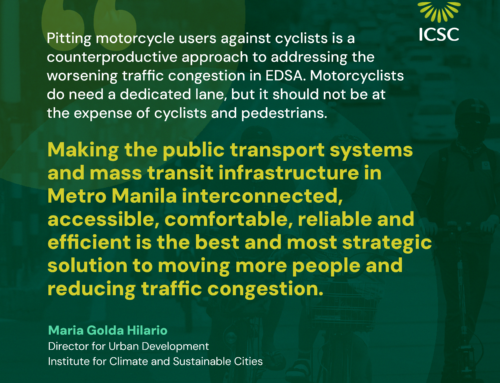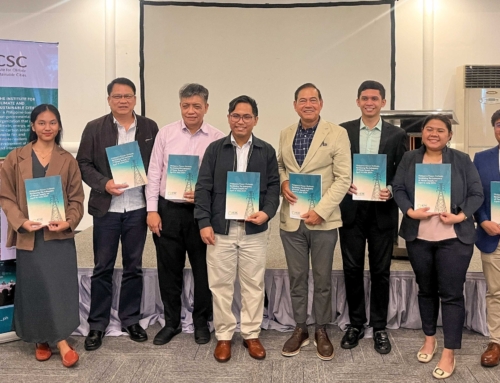QUEZON CITY, 20 April 2021 — The Philippine government has committed last April 15 to reduce the country’s greenhouse gas emissions by 75 percent from 2020 to 2030 in its Paris Agreement commitment or Nationally Determined Contribution (NDC) submitted to the United Nations.
Of the 75 percent target, which would come from the agriculture, wastes, industry, transport, and energy sectors, 72.29 percent is conditional while the remaining 2.71 percent is unconditional, meaning it will be undertaken without international funding or other support. The government said it shall “also endeavor to undertake equitable adaptation strategies with mitigation co-benefits and ensure their contribution to the national pandemic recovery.”
In a statement last Friday, April 16, Finance Secretary Carlos Dominguez III said, “The Philippines is submitting an ambitious NDC target of 75-percent reduction of GHG emissions by 2030 in the name of climate justice. The NDC will be our tool to upgrade our economy by adopting modern and low carbon technologies and approaches that would help mitigate the climate crisis and make our economy more resilient and our growth sustainable.”
“We expect that developed nations, which historically caused the global climate crisis, will deliver their commitments to the Paris Agreement with the right speed and scale to keep global average temperature from breaching the 1.5 degrees Celsius survival threshold. The critical time between now and 2030 gives us a window of opportunity for transformative climate action to ensure planetary well-being before it is too late,” added Dominguez, also the Chairman-Designate to the Climate Change Commission which facilitated the NDC formulation process.
In response, Rex Barrer, climate governance lead of the Institute for Climate and Sustainable Cities, said today, April 20:
“Resilience should not be conditional. Despite the NDC being the country’s new strategy for economic growth and pandemic recovery, it seems other agencies such as the Department of Environment and Natural Resources (DENR) and the Department of Agriculture (DA) are shirking from their duty to transform development in the country towards one that is in keeping with the highest ambition — as emphasized last Friday by no less than Secretary Dominguez.
“The DENR has put forward forest protection, restoration and reforestation initiatives under adaptation but fell short of identifying their large and relatively cost-effective mitigation potential.
“Meanwhile, the DA’s efforts on adaptation is expected, with mitigation as a co-benefit. These agriculture programs have already been in place and yet continue to be conditional on external support. It begs the question regarding how far the agency truly embraces the need for the country to push for its highest possible ambition, especially for a sector that contributes a bigger share of the Philippines’ emissions.
“It might not be the offer from DOE but that from the DA and DENR that tends to create more serious credibility issues concerning the integrity of the country’s NDC. We can and must do better than this.
“We will certainly be actively engaged with government and will continue to offer technical and policy support where needed. When the government succeeds in designing and implementing the country’s climate action plan, everybody wins.”
Barrer initially remarked last April 15:
“It is high time that the Philippine NDC is approved and officially submitted to the UN. We may have missed the December 31 deadline, but that never stopped the national government in doing their part to reach the country’s adaptation and mitigation targets.
“We recognize the frustration over the low unconditional number, but we also take hope in the Department of Energy’s (DOE) commitment to continuously update its pledge as reflected in the current effort to improve on the Philippine Energy Plan (PEP). The coal moratorium already demonstrated their leadership last year. The challenge now is to see the NDC process as a means by which the modernization of the electricity sector is realized, driven by genuine competition and premised on greater reliance on flexible generation.
“To this end, we are committed to support the government’s goal to rapidly modernize the country’s power sector and to ensure sooner rather than later the integration of transport modernization strategies into long-term energy development.
“The Philippines plans to achieve the 75 percent reduction in emissions through enhanced access to climate finance, technology development and transfer, and capacity building. With this, we reiterate the call for rich, high-emitting countries to be accountable and provide the needed resources and support for the mitigation efforts of developing countries. We only account for 0.3 percent of the world’s emissions, and we can only do so much on our end.
“The NDC should embody the country’s highest possible climate ambition, as written in a resolution by House Deputy Speaker Loren Legarda, and should serve as our strategy towards a climate-resilient, low carbon, and sustainable future. We are still a long way from that goal. It is now time to turn this pledge to transformative action.”
ABOUT ICSC
The Institute for Climate and Sustainable Cities is a Manila-based international policy group advancing climate resilience and low carbon development.
CONTACT
AC Dimatatac, media@icsc.ngo, +63 998 546 9788, +63 917 149 5649
###






